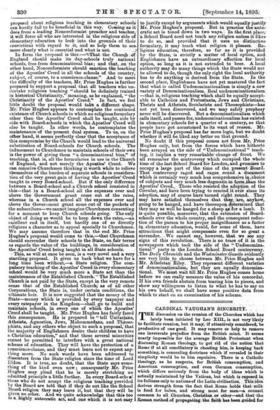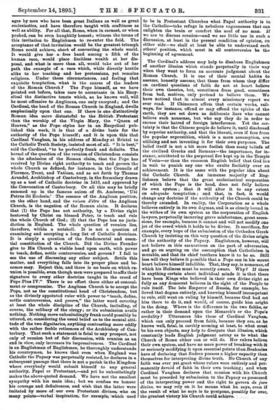CARDINAL VAUGHAN'S SINCERITY. T HE discussion on the reunion of the
Churches which has lately been initiated by Leo SUL, is not very likely to facilitate reunion, but it may, if attentively considered, be productive of one good. It may remove or help to remove one inveterate prejudice from the British mind. It seems nearly impossible for the average British Protestant when discussing Roman theology, to get rid of the notion that Rome if at all conciliatory is cheating him, is keeping back something, is concealing doctrines which if revealed in their simplicity would be to him repulsive. There is a Catholic theology, as he suspects, for British consumption, and American consumption, and even German consumption, which differs seriously from the body of ideas which is actually maintained by the Vatican, but which is exposed in its fullness only to nations of the Latin civilisation. This idea derives strength from the fact that Rome holds that-milk is food for babes, and strong meat for men—a counsel common to all Churches, Christian or other—and that the Roman method of propagating the faith has been guided for ages by men who have been great Italians as well as great ecclesiastics, and have therefore taught with craftiness as well as ability. For all that, Rome, when in earnest, or when pushed, can be even haughtily honest ; witness the terms of this invitation to Englishmen to re-enter the fold. The acceptance of that invitation would be the greatest triumph Rome could achieve, short of converting the whole world. It would give her a free hand among a fifth of the human race, would place limitless wealth at her dis- posal, and what is more than all, would take out of her path the example of a race which, while directly hostile alike to her teaching and her pretensions, yet remains religious. Under those circumstances, and feeling that exquisite temptation, what is the course of the leaders of the Roman Church ? The Pope himself, as we have pointed out before, takes care to accentuate in his Ency- clical the distinctive tenets which, as he knows well, will be most offensive to Anglicans, one only excepted ; and the Cardinal, the head of the Roman Church in England, dwells emphatically upon that one. If there is one distinctively Roman idea more distasteful to the British Protestant than the worship of the Virgin Mary, the " Queen of Heaven," as the Pope styles her in an Encyclical pub- lished this week, it is that of a divine basis for the authority of the Pope himself ; and it is upon this that Cardinal Vaughan, in his address of Monday at Bristol to the Catholic Truth Society, insisted most of all. " It is best," said the Cardinal, "to be perfectly frank and definite. The kernel of the question of the reunion of Christendom consists in the admission of the Roman claim, that the Pope has received by Divine right authority to teach and govern the whole Church as defined, for instance, in the Councils of Florence, Trent, and Vatican, and as set forth by Thomas Arundel, Archbishop of Canterbury, in the formulary drawn up as a test of Catholic doctrine in 1413, and approved by the Convocation of Canterbury. Or all this may be briefly summed up in the famous axiom of St. Ambrose, 'Uhl Petrus ibi Ecclesia.' The essence of the Anglican position, on the other hand, and the raison d'etre of the Anglican Church, is the negation of the Roman claim. It declares that (1) the Pope has not authority, by a Divine right bestowed by Christ on blessed Peter, to teach and rule the whole Church of God ; (2) that the Pope has no juris- diction in England. The whole question of reunion lies, therefore, within a nutshell. It is not a question of examining and accepting a long list of Catholic doctrines. It is simply a question of the fundamental and essen- tial constitution of the Church. Did the Divine Founder give to His Church a visible head upon earth, with power to teach, define, settle controversies, and govern ? I fail to see the use of discussing any other subject. Settle this matter, and everything falls into its proper place and be- comes easy. Reject this, and there is no basis on which re- union is possible, even though men were prepared to affix their signature to every other doctrine taught in the creed of Pope Pins IT." There is no effort there either at conceal- ment or compromise. The Anglican Church is to accept the Pope, not as the constitutional head of Christendom, but as the divinely appointed ruler with power to "teach, define, settle controversies, and govern," the latter word covering at least the whole discipline of the Church, including, of course, the celibacy of the clergy; or its submission avails nothing. Nothing more unhesitatingly frank could possibly be uttered, or, considering the usual belief as to the mental atti- tude of the two dignitaries, anything contrasting more oddly with the rather feeble reticences of the Archbishop of Can- terbury. That such a statement is fatal to any prospect, not only of reunion but of fair discussion, with reunion as an end in view, only increases its impressiveness. The Cardinal is an Englishman of Englishmen, he thoroughly understands his countrymen, he knows that even when England was Catholic the Papacy was perpetually resisted, he declares in a subsequent passage that there is not a parish in the Kingdom where everybody would submit himself to any general authority, Papal or Protestant,—and yet he unhesitatingly makes the above-quoted demand. We have not the smallest sympathy with his main idea ; but we confess we honour his courage and definiteness, and wish that the latter were imitated by more of our own Protestant divines, who on many points—verbal inspiration, for example, which used
to be in Protestant Churches what Papal authority is in the Catholic—take refuge in nebulous vaguenesses that can enlighten the brain or comfort the soul of no man. If we are to discuss reunion—and we see little use in such a discussion, at least in the present condition of opinion, Cu either side—we shall at least be able to understand each others' position, which must in all controversies be the beginning of agreement.
The Cardinal's address may help to disabuse Englishmen of another illusion which stands perpetually in their way when they want to form an accurate judgment about the Roman Church. It is one of their mental habits to assume, honestly assume, that those from whom they differ on cardinal questions of faith do not at heart believe their own theories, but, sometimes from good, sometimes from bad, motives, only pretend to believe them. We have noticed that in almost every missionary report we ever read. If Chinamen affirm that certain works, rail- ways, for instance, offend or may offend the spirits of the earth, they are set down as deliberate liars who cannot believe such nonsense, but who say they do in order to excuse their hatred of foreign interference. Yet the cer- tainty is that the Chinese people do believe it, until disabused by superior authority, and that the literati, even if free front the popular superstition, which is a mere assumption, are utilising and not inventing it for their own purposes. The belief itself is not a bit more foolish than many beliefs of the civilised Greeks and Romans—the importance, for in- stance, attributed to the perpetual fire kept up in the Temple of Vesta—or than the common English belief that God lips in wait to punish any one who exults foolishly over an achievement. It is the same with the popular idea about the Catholic Church. An immense majority of Eng- lishmen believe that the great ecclesiastical corporation of which the Pope is the head, does not fully believe its own system ; that it will alter it to any extent on adequate temptation ; and that, in fact, it would change any doctrine if the authority of the Church could be thereby extended. In reality, the Corporation as a whole believes entirely in its own dogmas, and is as closely bound in the withes of its own system as the corporation of English lawyers, perpetually incurring grave misfortunes, great seces- sions, for example, because it cannot and will not modify one jot of the creed which it holds to be divine. It sacrifices, for example, every hope of the submission of the Orthodox Greek Church by insisting on this very question of the divine origin of the authority of the Papacy. Englishmen, however, will not believe m this earnestness on the part of adversaries, and go on arguing on the assumption that Catholicism is mutable, and that its chief teachers know it to be so. Still less will they believe it possible that a Pope can in his secret heart believe himself infallible. That, they say, is nonsense, of which his Holiness must be secretly aware. Why ? If there is anything certain about individual minds it is that there have been Kings who believed in their own divine right as fully as any democrat believes in the right of the People to rule itself. The late Emperor of Rnasia, for example, be- lieved that dogma entirely, and knowing himself incompetent to rule, still went on ruling by himself, because God had set him there to do it, and would, of course, guide him aright in the doing. Where is the difference in the two faiths, or rather in their demand upon the Monarch's or the Pope's credulity ? Utterances like these of Cardinal Vaughan, which can only proceed from faith, because they are, as he knows well, fatal, in earthly seeming at least, to what must be his own objects, may help to dissipate that illusion, which
constantly leads English judgment astray as to what the Church of Rome either can or will do. Her rulers believe their own system, and have no more power of breaking with it or seriously modifying it upon essential points than Brahmins have of declaring that Sndras possess a higher capacity than
themselves for interpreting divine truth. No Church of any faith was ever yet great whose rulers were entirely and per- manently devoid of faith in their own teaching ; and when Cardinal Vaughan declares that reunion with his Church must be preceded by submission to the Papacy as possessed of the interpreting power and the right to govern de jure divino, we may rely on it he means what he says, even if the result of what he says is to postpone, possibly for ever, the greatest victory his Church could achieve.



































 Previous page
Previous page